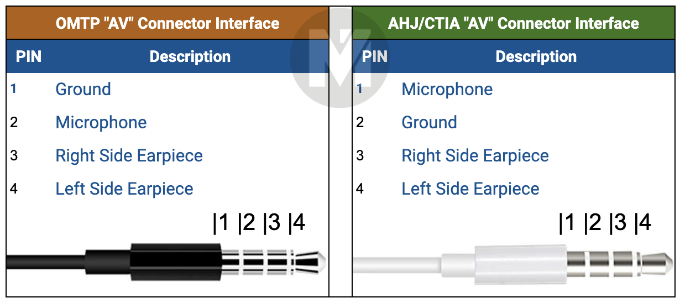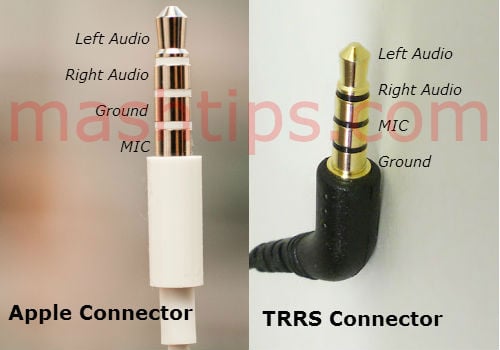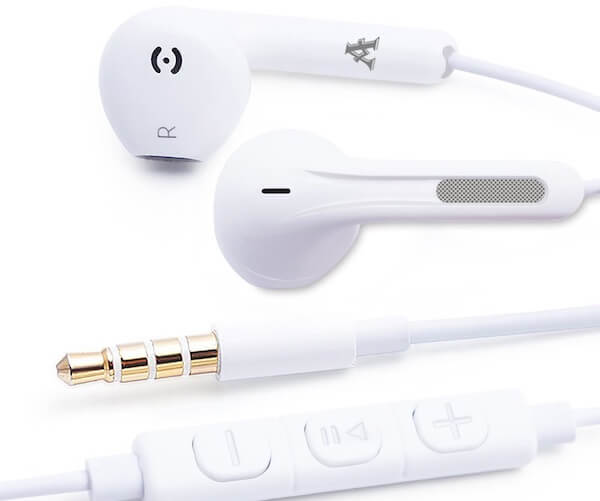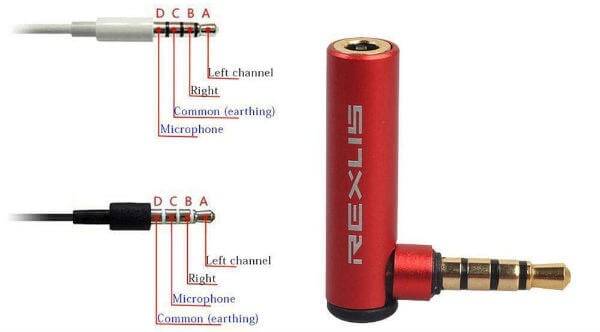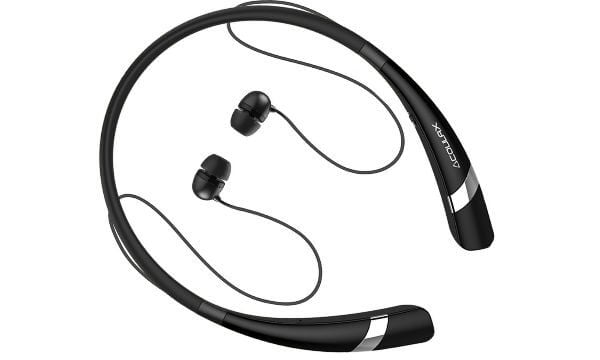First of all, please be aware that this is neither an issue with your headphones nor smartphone. Apple has a different design standard for its headphones, and that design is not based on the universal headphone design (like Android headphones) and that is why Apple headphones are not 100% compatible with other non-Apple smartphones and devices.
What are CTIA and OMTP Standards?
There are two different standards are using with the 3.5mm TRRS headset wiring configuration. The most widely used one is the Open Mobile Terminal Platform (OMTP) standard that is used with old Android phones, Nokia devices, laptops, etc. The Ground pin is connected next to the headset sleeve in this OMTP standard. The new standard one is American Headset Jack (AJH) or called Cellular Telecommunications Industry Association (CTIA). The Microphone point is next to the sleeve end on these headsets and the Ground pin is placed between Microphone and Right Earpiece Pins. The AHJ standard is used by Apple headsets, latest LG and Samsung phones. Technically, if you use an AHJ headphone to an OMTP device, the Microphone will not work and maybe the headphone controllers may not respond as expected.
Headset Standards used in Android & Apple Devices
In Android and Apple world there are two different types of headsets are using to connect to the phones. Let me make it clear, Android phones are still following the standard headphone wiring format (CTIA) for their headphone PINs. However, Apple has been adopted a different configuration (OMTP) with their headphones and obviously, that is not compatible with other devices.
1, Standard (OMTP) Headset (Used in Android and PCs)
(Wiring configuration: Left Audio, Right Audio, Mic, Ground) All the new smartphones are using the headset with TRRS (Tip, Ring, Ring, Sleeve) configuration. These configuration is using for headphones that have an attached microphone and a radio push-to-transmit (or push-to-talk) feature. Almost all of the Android phones are using this standard headset configuration. In this TRRS configuration, each tip, ring and sleeve component has its own wire terminal counterpart inside the housing with a pin-out in the order of Left Audio, Right Audio, Mic, and Ground.
2, Non-Standard (CTIA) Headset (Used in Apple Devices)
(Wiring configuration: Left Audio, Right Audio, Ground, Mic) Apple and other smartphone manufacturers are using this same standard for their headsets. However, Apple made a slight change in its wiring configuration. Apple is changed its headphone pin-out order to Left Audio, Right Audio, Ground, Mic that is different from the standard (TRRS) pinout configuration Left Audio, Right Audio, Mic, Ground. This wire configuration makes Apple headphones to work with only Apple devices (all the features) like the iPhone, iPad and other Apple products.
Can we Interchange the Headset Wires to Match Apple Headphone Configuration?
What will happen if you change or alter the wires of MIC and Ground? Can you use this altered headset with your Android phone? Personally, I wouldn’t recommend that, because Apple’s headset has another minor change compare to other standard headphones. This Apple headset has specific resistance set between the MIC and Ground cable to create pulses for headset control buttons. This resistor set value is different than the standard headset. Hence, this different value of the resistor, when you use other smartphones with modified Apple headphones, you may not get the same signal amplitude and this may cause to malfunction the headphone controls. When you press these buttons, Apple device sensing the electrical pulse with a definite amplitude (based on the internal resistance) and converting to the command codes to control the iPhone, iPad or similar Apple devices. These pulses’ amplitude and timing is not compatible with other Smartphone or devices and may not able to control your Android or Nokia phone with these same headset controls.
How to Make iPhone Headset Compatible with Android or Vice Versa?
There are a couple of workarounds you can try out to make compatible the headphone with your Android. However, these solutions are not going to solve your problem 100%. Those who are interested to find a solution, go through a few of those, and you can pick the best one.
1, Use Bluetooth Third-party Earbuds.
Those who are really like the Apple earbud design, and still want to use with their Android phone, there are plenty of third-party headsets are available in the market imitating the same design of Apple, but come with Bluetooth connectivity. Since the connection is made through Bluetooth, the controls are going to be compatible with both iPhone and Android devices. The Yostyle Wireless Headphones is coming with V4.1 Stereo Earphones and Noise Cancelling Earbuds.
2, Use Third-party Wired Headphones.
3, OMTP to CTIA Headphone Converter Adapter
4, Use a Bluetooth Wireless Headset.
In fact, the main concern while choosing the headset is the battery life, fit type and additional controls that offer by iOS through the headset buttons. The headset controls are offering the handsfree functions to ask Siri, Control Volume, Music Play, Call Answer Reject, etc. For iPhone users, your iPhone headset can do a lot of things that you think and we listed 12 Things You Should Know that Your iPhone Headphone Can Do.
5, Android App to Control iPhone Headset
Still no luck with Android headsets! You can try this app available from Google Play Store called Headset Button Controller. According to Google Play Store, “Headset Button Controller is very configurable, allowing you to play music, change tracks, adjust volume, answer phone calls, start Voice Command and many other things, just by clicking the button on your headset.” Hope this will resolve Apple headset compatibility issue with Android and Windows phone. Please let us know if there has an alternate workaround to resolve this problem. 1, Standard (CTIA) Headset (Used in Android and PCs) (Wiring configuration: Left Audio, Right Audio, Mic, Ground) And here: 2, Non-Standard (OMTP) Headset (Used in Apple Devices) (Wiring configuration: Left Audio, Right Audio, Ground, Mic) ……. Because of this error, now I’m confused about which phone (android/iphone) uses which standards…. ? Kindly correct the article, please….. Thanks again….. Notify me of follow-up comments by email. Notify me of new posts by email.
Δ


